- Home
- Lise McClendon
Painted Truth Page 4
Painted Truth Read online
Page 4
I glanced around the burned-out hulk, annoyed that he wouldn’t answer. Eden wouldn’t be happy when she saw this. I was glad I had talked her out of joining me today. “Yeah, I’m done for now.” I stared at Scanlon. “Was this where he was?”
His eyes dropped to the spot. “What was left of him.” He gathered up his samples and equipment and herded me to the door. We parted in the alley, both of us avoiding the slab of wet carpet where the policeman had left his mark.
I MADE MY way across the square, taking the long way instead of cutting through the grass. The weekend had brought a fresh onslaught of tourists to savor the day’s shimmering sunshine and blue, blue sky. A line was forming for the stagecoach rides. I waved up at the stagecoach driver decked out in fringed leather chaps, muslin duster, and twenty-gallon white hat. His bushy red beard didn’t obscure his grin as he jumped down, tipped his hat to me, and helped four boisterous kids with cotton candy into the stagecoach. I inched past, fighting for space on the boardwalk, and returned to the gallery.
Paolo was brewing coffee. He poured me some and I accepted. This seemed to be the limits of our courtesy these days. I pulled out a yellow legal pad at my desk to begin the listing of the artworks in Eden’s gallery. I pawed through a file of gallery brochures and found hers for the Tantro show. Some of the works were pictured in the fancy, four-color brochure that must have set Eden back a bit of change. It was glossy and well designed by the best graphic artist in town. Unfortunately the bottom line was that it didn’t improve her bottom line. I stared at the abstracts in the brochure and didn’t like them any better than when I had seen them hanging. They were disjointed and jarring, neon green and dull brown with hard edges, almost cubist without any of the sardonic grace of cubism. So different from Tantrum’s early work that it boggled the mind.
I picked out the titles of the six works pictured in the brochure and matched them up with ones on my list. Eden had even included the prices in her brochure, something I had advised against, but now it was helpful and I plugged them into the list too. I wondered if she had a price list for the others somewhere in the gallery, and if it had survived. Probably not; she would have to rely on her memory.
I stood up to get my Rolodex down from the shelf and began finger-walking through it, looking for more contacts to call about Ray Tantro. Out in the gallery I heard the bell on the door ring several times and listened with half an ear to the conversations. Paolo was in his element, educating the public about the beauty of handcrafts and paints. He was in control, I told myself as I picked up the phone and called a friend who owned a gallery in Tucson.
A dead end. Not only did she not know where Ray Tantro had shown paintings in that area, she had never even heard of him. I sighed. This wasn’t going to be easy. I tried someone else, in the East where Tantro went to art school briefly. I had met this gallery owner, Gordon Tell, at an auction in New York a few years ago. He lived in Boston.
“Ray Tantro? Sure, I remember him,” Gordon said. “Sorry to hear he’s passed on. Haven’t seen any of his stuff in years. No, wait. A couple years ago somebody wanted me to buy one of his big landscapes, those Montana ones?”
“Did you?”
“Guy wanted an arm and a leg. What am I, a charity service? Seriously, Alix, I think he wanted fifty thousand. Ridiculous.”
“Haven’t his prices gone up on those old ones? What was the date on it?”
“I don’t know, ‘74, ‘75. Yes, they have gone up. But what were they selling for then? A thousand, fifteen hundred. That’s quite a leap.”
“What would you have paid for one?”
“I don’t know, possibly five. I could maybe get ten or twelve in the gallery. But I didn’t even bother to talk to the seller. He wasn’t rational.”
“Ever see any new pieces of Tantro’s? Or hear of any shows?”
“No, the latest thing I’ve seen is that ‘75,” Gordon said. I thanked him and hung up.
Who else could I call? I tried two other galleries, but there was no answer at either. Then I looked at the fax machine.
I pulled out a sheet of paper and quickly wrote up a freehand message to five art galleries: The J. Paul Getty Museum in Malibu, the Museum of Modern Art in New York, the Hirshhorn Museum at the Smithsonian in D.C., the Art Institute of Chicago, and the Yellowstone Art Center in Billings, Montana, since Tantro had once lived in Montana. I pleaded, in a lighthearted but urgent way, for information about Raymond Tantro paintings owned, bought, sold, or offered to them in the last twenty years. I sent out the fax, running the sheet through five times, sat back, and sighed. Their offices would probably be closed today, perhaps until Monday or even Tuesday. All I could do was wait.
Paolo stuck his head into my office and saw me sitting with my arms crossed, frowning. “I need you out here, Alix. Now.”
He disappeared before I could reply. I stood up, stared at the fax machine one last time to will it to respond, and went off to do my duty to God and tourists.
IT WAS LATE at night—Saturday—when Eden finally showed up at the apartment. Business had picked up and I had no more time to make phone calls about Ray Tantro. Paolo brought us in lunch from the Cadillac Grill, an unexpected pleasure, and we ate and cajoled customers at the same time. Paolo sold a beautiful earth-colored weaving and I sold two clay pots and a watercolor. When the night girl, Megan, came in at seven, I dragged myself up the stairs, starving and feeling the return of the fatigue from my Snake River adventure. My lungs had taken on a low-grade ache. Just about every muscle in my body hurt, especially my arms. My shiners were now testing all the colors on paint chips at Coast-to-Coast Hardware. I realized on reaching the dark, empty apartment that I had been hoping my new roomie would have a big hot dinner on. Life was disappointing. I warmed up a couple of burritos and ate them smothered with hot sauce, then took a shower.
Eden arrived at ten-thirty, blowsy and giddy. The smell of her at first was of cigarettes, her personal perfume. I was wrapped in a plaid wool blanket, drinking a glass of wine, hoping to anesthetize my body for sleep. I wrinkled my nose at the smell of her.
A black beret was stuffed in the pocket of a thick Icelandic sweater I’d lent her. She wore baggy khaki pants, the same ones she’d worn the day of the fire—and every day since. The crying jag of the first night, the sorrow about Ray Tantro, all that side of Eden was not in evidence tonight. Her face was flushed and bright.
“Paolo took me out for a drink,” she said. “Just to cheer me up.” She looked at me squarely, in an uncomfortably intimate way, then walked over and squatted by my chair. She put her warm hand on mine. I could really smell her now, a mixture of barroom smoke and beer.
“You have to tell me, Alix. I mean it. Seriously. You and him … ? I know you had a big thing going. Does it bother you terribly, terribly if I go out with the gaucho?”
I squinted at her. “The gaucho?”
She smiled. “Paolo. I call him the gaucho. He is so sweet.” She was lost in thought for a moment, then frowned at me. “So it’s over between you two? You’ve been so good to me, letting me stay here.”
The gaucho? Oh, please. I knew he cultivated the persona of the debonair swashbuckler with women but, honestly, I didn’t want to know about it I could imagine Paolo’s smooth voice whispering in her ear, rubbing her back as she called him her gaucho.
Eden swayed, catching her footing as she stood up again. I set my wine down. It didn’t matter what I said to her. She wouldn’t grasp any meanings tonight. I wanted to work on the list of artworks for the appraisal due in less than forty-eight hours, but I’d get no work from Eden tonight.
“What you and Paolo do is none of my business,” I said, getting up. I tried to mean it. Eden dropped into my chair. She rubbed her eyes and sighed deeply. The gaucho had made her forget fire, death, and broken dreams. He had that power.
Paolo. I walked to the window and wondered if he and I would ever be finished. Maybe there would always be that spark between us, struggling to light if we
just gave it a chance. We hadn’t given it a chance for some time. Was it possible I still carried a torch, still hoped it would work out? I had to admit to a twinge of jealousy at her blissful expression as she spoke of my partner. My partner. Once he had been so much more: my lover, my best friend. Was that all over? “We saw Martin what’s-his-name in the restaurant tonight,” Eden said behind me. “Paolo told me about your problem with him. What a mess. You gotta straighten that out, honey.”
I turned back to her. She was rubbing her fingertips on her scalp, fluffing her short dark hair. “He told you?”
“I know you must feel sorry for him because he’s in a wheelchair and everything. But you can’t ruin your business because of that. I mean, Paolo said you guys are going to go broke if you buy Martin’s stuff.”
“Oh, he did, did he?” I struggled to control my hurt at Paolo confiding in Eden. I took a breath. He was not mine anymore. He’d been confiding in plenty of girls over the last couple years. “Well,” I said, “those Latins, you know, they tend to exaggerate. Don’t believe everything Paolo tells you.”
“You’ve still got a little fire burning for him, don’t you? Just tell me, Alix, just give me the word. I mean, it won’t be easy. He is so hot! And that accent. Ooh!”
I bit my tongue. I didn’t want to talk about Paolo. I didn’t want to admit anything. So I did what my mother would have done. I changed the subject. “Listen, I wanted to work on the inventory of the Timberwolf tonight. So you can get your settlement.”
“Mmmm.” Eden’s eyes were closed, her lips smiling. “Can we do it tomorrow? You want to drive out to the park and take some pictures with me?”
“It’s my Sunday to work,” I said. “Unless we go in the morning.”
“Sure. Wake me up early.”
I said good night. At my bedroom door I turned. Eden had turned on the television and was sitting in the light of the floor lamp, rummaging through her purse. I wondered if she was having trouble sleeping, if the death of Ray Tantro was sitting heavy on her mind.
As I crawled into bed, I tried to put aside my discomfort over her probing about Paolo. She was just being a good friend, seeing if the coast was clear. It was good she asked, I told myself. Even though it stirred up feelings that should have remained buried.
I stared at the ceiling in the moonlight, making myself think about Ray Tantro instead of Paolo. It was easier to deal with a dead man. But it would be even easier if he hadn’t dropped out of sight for all those years. Tomorrow, I whispered, tomorrow Ray Tantro will reveal himself to me.
I watched the clock, and the square of moonlight that crawled across the floor. I got up and opened the window a crack, letting mountain-chilled air pour in. I made mental lists, of places to call about Ray’s lost years: prisons, rehab clinics, art schools, art galleries, colleges. Could I do it by Monday? How could I do it at all? I made myself think about the future, about Carl coming down to visit. About his big, warm body against me in this bed. Still, sleep did not come.
At two forty-five I got up and turned the television off. Eden was snoring again.
4
THE JACKSON TOWN Hall is located in a modern wood-frame building with a big clock tower, a few blocks from the gallery. Unimposing, with no Roman columns, no corny western storefront, it reminded passersby of an overgrown chamber of commerce. Flowers cascaded from tubs on the decking that led through an arched walkway covered with moss rock. I pushed through the door and found the small, high-ceilinged lobby crammed with people, newsmen and -women from the looks of their spiral notebooks, sophisticated cameras, and huge video packs.
I was late. It was past eleven and I had intended to turn in this appraisal first thing this morning. But Eden had gone to dinner last night with Paolo again, after his polo match, and had come home late. The afternoon at the gallery had been busy but unproductive. Unable to rouse Eden in the morning, I drove my old Saab out to Wilson to feed my horse, Valkyrie. She is a spirited chestnut mare, very unpredictable. I have to bring her oats or she’ll have nothing to do with me. She was friendly for a change and nuzzled me with her soft nose. Nothing like the love of a big, affectionate animal to bring you down to earth.
I did get an hour of information gathering out of Eden before she left for dinner. She knew a little about Ray, mostly from his early years, where he’d had shows back when he was young and famous. I spent the evening getting the bio together, what little there was to know. As I stood in the lobby outside the police department door, waiting for somebody to come up and escort me back to Charlie Frye’s office, I read it again.
Raymond Wayne Tantro Born: Torrington, Wyoming, 1950. Died: Jackson, Wyoming, 1993. Attended Rhode Island School of Design, 1968-70. One-man show at RISD, 1969. Island Gallery, Providence, 1969. Cape Arts, Boston, 1970. Winston & Scharff, NewYork, 1970. Moved to a ranch near Livingston, Montana, in the Paradise Valley, 1970. Shows at several galleries in the area, had one-man shows in Denver, Phoenix, Salt Lake City, and Billings. In 1975, he sold the ranch. Arrived in Jackson area approximately February this year.
The appraisal followed. A simple appraisal, based on the prices Eden told me they were asking, which were extremely overblown: $10,000, $12,000, $20,000 each for pieces that had no past and no future, that weren’t of a style Tantro was remembered for, and weren’t likely, had they survived, to be remembered themselves. I discounted the prices for such factors as quality, reputation, desirability, and availability, and put a price on them that was, like much in this business, the product of an educated gut reaction.
I looked at the facts on Tantro’s life. They were pretty damn sparse. I had made calls to everyone on the bio—Cape Arts, Winston & Scharff, Rhode Island School of Design, all of them. They confirmed what I already knew and added nothing. Tantro had had no contact with any of these people since about 1979 when the last pieces in his “Montana Cycle” had sold. At that time he was living somewhere in Wyoming. There were people to call that I hadn’t had time to call: gallery owners who may have shown Tantro’s work during his “dark” years, unknown associates, drinking buddies and employers, relatives who could tell me where he’d been. The fax machine had gone off once this morning, with a reply from the Art Institute of Chicago that was singularly unhelpful.
It was frustrating. I shouldn’t have told Charlie I could get this appraisal done in three days. Normally it wouldn’t be difficult. But with Ray Tantro we were dealing with thin air. He had been so promising. What had gone wrong? Where the hell had he been all those years? Nobody seemed to know.
Tantro had a hole in his past big enough to drive a Mack truck through. Consequently, so did the bio. I made up my mind not to give the bio or appraisal to Frye, to work on it some more. I would ask for time, a week, to do the job right. Eden would just have to wait.
I closed the folder, slapping it against my hand in hopes someone would hear. The man next to me jostled his camera bag as he checked the settings on his expensive black lens. “Shit,” he said to no one in particular. “I thought he said ten-thirty.”
The photographer was tall with a three-day growth on his chin and a ball cap that read King Ropes. I wondered if he worked for the Jackson Hole News. He bumped me again with his voluminous bag.
“Excuse me,” I said, pushing against the thing. The photographer frowned at me. “What’s the big deal this morning?”
“Press conference.” He looked away.
“With who?”
He frowned again, surprised I was still talking. He thought he’d dismissed me from his presence. “Police chief.”
“Yeah? What about?”
As I asked, the sound of footsteps came toward us across the dark slate floor. Frye led the way, in his gray suit and string tie. Behind him came Rex Scanlon, the fire investigator, in the same jeans but wearing a navy sport coat, then a woman I didn’t recognize. They made their way through the desks and glass door into the lobby where the news people waited. From the back of the crowd I had to stand on tiptoe to see arou
nd the photographers.
Frye took out a pair of reading glasses and hooked them over his beak. Looking at a sheet of paper in his hands, he cleared his throat, then looked up as the strobes blinded him. He winced, his bone-hard face creased in a frown.
“Good morning. We have a short statement to make, then we’ll take questions.” He cleared his throat again. “Last Thursday, the Timberwolf Arts gallery at 142 East Cache was burned. Inside the building the body of a man was found. This man has been identified as one Raymond Tantro, a self-employed artist who lived in the Jackson area. The fire is now believed to have been arson. Investigation into the fire is ongoing. The death of Raymond Tantro has been judged a suicide.”
Charlie stopped abruptly, pressing his lips together, removing his glasses from his nose. He looked like he wanted to say more but thought better of it. Immediately the questions began from the reporters.
“How was the fire started?” someone up in front asked. I craned my neck; I knew that voice.
Frye turned the question over to Rex Scanlon. He looked as tired as ever. “A final determination hasn’t been made, as Chief Frye stated. But…” He brightened. “But we believe the fire was begun with a balloon full of gasoline and a candle. The balloon was placed near the burning candle. As the candle burns down, it gets closer to the balloon until it melts through the plastic. At that time the gasoline lights on fire.”
“Where was this in the building?” Now I recognized the voice of Danny B.
“On the main floor,” Scanlon said.
“Near the victim?”
“Yes.”
“Was that the only point of origin?” someone asked.
Scanlon’s eyebrows went up, with effort. “Actually no. There was another fire in the attic area.”
“Is that what happened to the roof?”
“Yes.”
“What happened to the roof?” another voice wanted to know.
Scanlon paused and looked at his feet. When he scanned the crowd, acknowledging me briefly, his voice held a mild excitement. “An interesting technique. Another candle, or at least the waxy remains of one, was found on the attic floor. The roof of the building was literally blown away. We believe this may have been caused by vaporized gas that was ignited by the candle as it settled around the flame.”

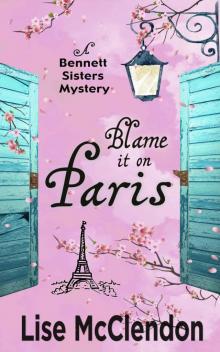 Blame it on Paris (Bennett Sisters Mysteries Book 7)
Blame it on Paris (Bennett Sisters Mysteries Book 7)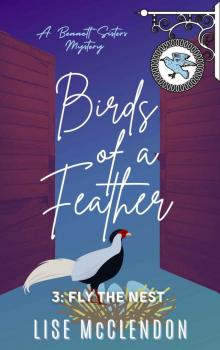 Birds of a Feather: 3: Fly the Nest (Bennett Sisters Mysteries Book 16)
Birds of a Feather: 3: Fly the Nest (Bennett Sisters Mysteries Book 16)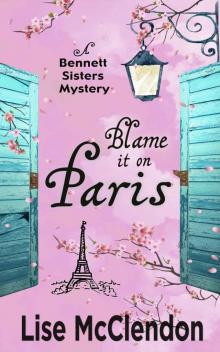 Blame it on Paris
Blame it on Paris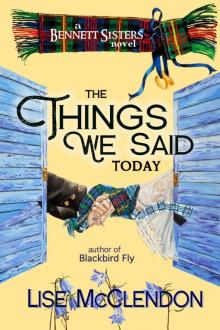 The Things We Said Today
The Things We Said Today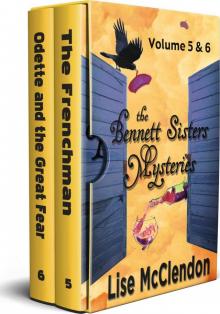 Bennett Sisters Mysteries Volume 5 & 6
Bennett Sisters Mysteries Volume 5 & 6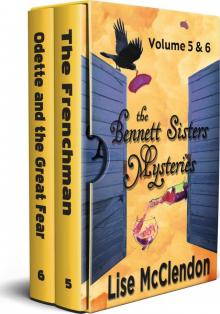 Bennett Sisters Mysteries Box Set 2
Bennett Sisters Mysteries Box Set 2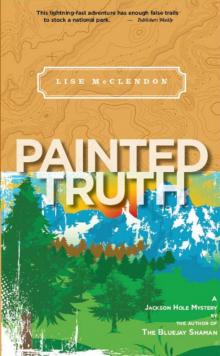 Painted Truth
Painted Truth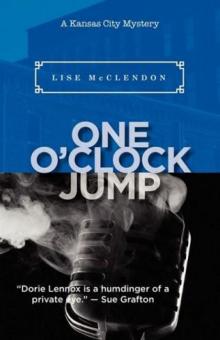 One O'Clock Jump
One O'Clock Jump The Bluejay Shaman (Alix Thorssen Mystery Series)
The Bluejay Shaman (Alix Thorssen Mystery Series)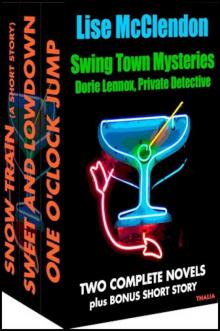 Swing Town Mysteries Dorie Lennox Box Set
Swing Town Mysteries Dorie Lennox Box Set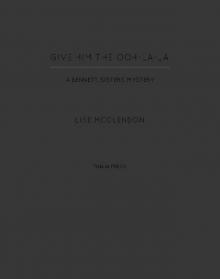 Give Him the Ooh-la-la
Give Him the Ooh-la-la Blackbird Fly
Blackbird Fly All Your Pretty Dreams
All Your Pretty Dreams Nordic Nights (The Alix Thorssen Mysteries)
Nordic Nights (The Alix Thorssen Mysteries)